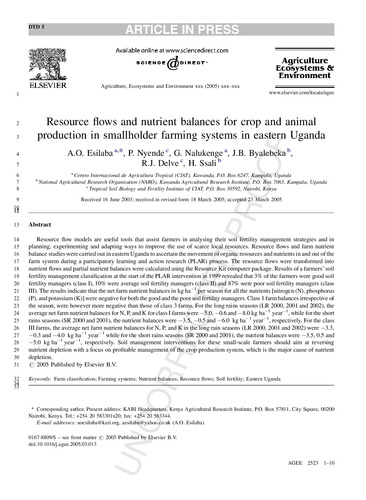Resource flows and nutrient balances for crop and animal production in smallholder farming systems in Eastern Uganda
Resource flow models are useful tools that assist farmers in analysing their soil fertility management strategies and in planning, experimenting and adapting ways to improve the use of scarce local resources. Resource flows and farm nutrient balance studies were carried out in eastern Uganda to ascertain the movement of organic resources and nutrients in and out of the farm system during a participatory learning and action research (PLAR) process. The resource flows were transformed into nutrient flows and partial nutrient balances were calculated using the Resource Kit computer package. Results of a farmers soil fertility management classification at the start of the PLAR intervention in 1999 revealed that 3% of the farmers were good soil fertility managers (class I), 10% were average soil fertility managers (class II) and 87% were poor soil fertility managers (class III). The results indicate that the net farm nutrient balances in kg ha?1 per season for all the nutrients [nitrogen (N), phosphorus (P), and potassium (K)] were negative for both the good and the poor soil fertility managers. Class 1 farm balances irrespective of the season, were however more negative than those of class 3 farms. For the long rains seasons (LR 2000, 2001 and 2002), the average net farm nutrient balances for N, P, and K for class I farms were ?5.0, ?0.6 and ?8.0 kg ha?1 year?1, while for the short rains seasons (SR 2000 and 2001), the nutrient balances were ?3.5, ?0.5 and ?6.0 kg ha?1 year?1, respectively. For the class III farms, the average net farm nutrient balances for N, P, and K in the long rain seasons (LR 2000, 2001 and 2002) were ?3.3, ?0.3 and ?4.0 kg ha?1 year?1 while for the short rains seasons (SR 2000 and 2001), the nutrient balances were ?3.5, 0.5 and ?5.0 kg ha?1 year?1, respectively. Soil management interventions for these small-scale farmers should aim at reversing nutrient depletion with a focus on profitable management of the crop production system, which is the major cause of nutrient depletion.

